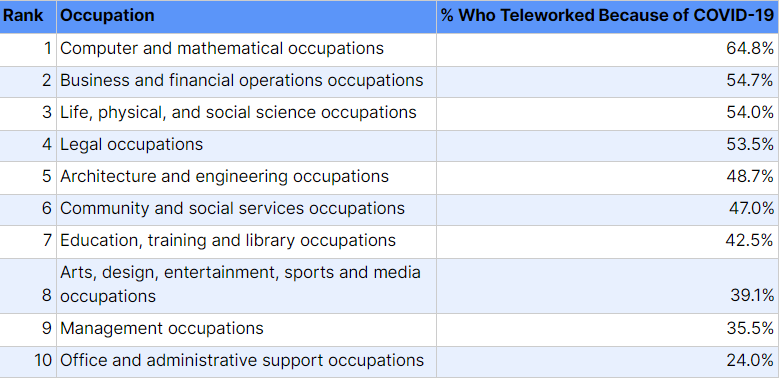Getting Hired in Today’s Remote Work Environment
Introduction: Remote Work Becomes a New Normal
The growth of remote working, as spurred by the COVID-19 epidemic, has prompted an at once sudden and now sustained growth in the popularity of remote work (also referred to as telework) across several industries. According to a study conducted by Clutch.co, before the pandemic, 47% of American survey participants had “Never” worked remotely. After COVID-19, 44% of survey respondents stated that they worked remotely “5+ days per week”.
Additionally, a September 2020 report from the Bureau of Labor Statistics found that the occupation categories with the most remote workers were “Computer and mathematical occupations”, with 64.8% of individuals working remotely, “Business and financial operations occupations” with 54.7% working remotely, and “Life, physical, and social science occupations”, with 54% of those employed teleworking. In short, an increasing share of work (much of which was accomplished online before the pandemic) has increasingly shifted to being practiced remotely, changing the status quo for many job seekers.
Planning to Get a Remote Job: Beginning with the End in Mind
Before looking for remote work, consider if you are ready for working remotely, and ultimately, what your end goal is for obtaining a remote job. Remote work allows one to work wherever they please, granted that they have an internet connection. Unlike in-person work, working from home or another location often requires a degree of self-discipline to keep on top of deadlines and maintain a sense of professionalism, as many find it easier to “slack off” when in the familiar surroundings of one’s own home. This much being said, remote work can save time and money for workers as they no longer need to commute. Also, remote work can allow parents to spend more time attending to their children, which may be particularly pertinent, given the recent rise in remote schooling.
Many remote positions are accomplished online — therefore you might need to invest in acquiring a sufficiently fast computer to accomplish work tasks. Furthermore, most remote positions require a stable internet connection with sufficiently high bandwidth to access work-related materials online, such as video conferences, instant messages, and cloud storage, among other tools. Due to the popularity of videoconferencing, it is also worth checking if you have a webcam and microphone (or headset) to communicate online. If your computer doesn’t have a webcam, keep in mind that it’s also often possible to access video conference apps using a smartphone or a tablet.
After taking an inventory of your mental and technological preparedness for remote work, it is useful to consider what type of remote work you are seeking. As seen in the chart from the BLS’ data above, some industries have implemented telework more so than others. If working remotely within your current line of work is underrepresented or unavailable, it may be necessary to pivot your career choice to a field that allows for telework, considering you are interested in doing so.
Applying for a Remote Job: Things to Take into Consideration
After reviewing your readiness and willingness to move towards working remotely, it’s time to begin making your search for remote jobs. If you haven’t already, creating a LinkedIn profile can be a beneficial online asset for your work life, as displaying your work history and accomplishments makes it easier for companies and hiring firms to find and view you. Additionally, LinkedIn makes it reasonably easy to build up a professional network of coworkers (former and current) and other colleagues (such as friends from college). Following companies and expanding your network on LinkedIn can be a great way to scout out new job openings, in addition to staying on top of business trends.
Additionally, recruiting firms, including New York Technology Partners, have adapted their hiring strategies to find and hire an increased amount of remote talent during the pandemic. Working with a recruiter can be a significant aid to job seekers, as they have a vested interest in helping you get a job. Moreover, a recruiter can give you useful personalized advice and feedback based on your job preferences and prior work experience.

